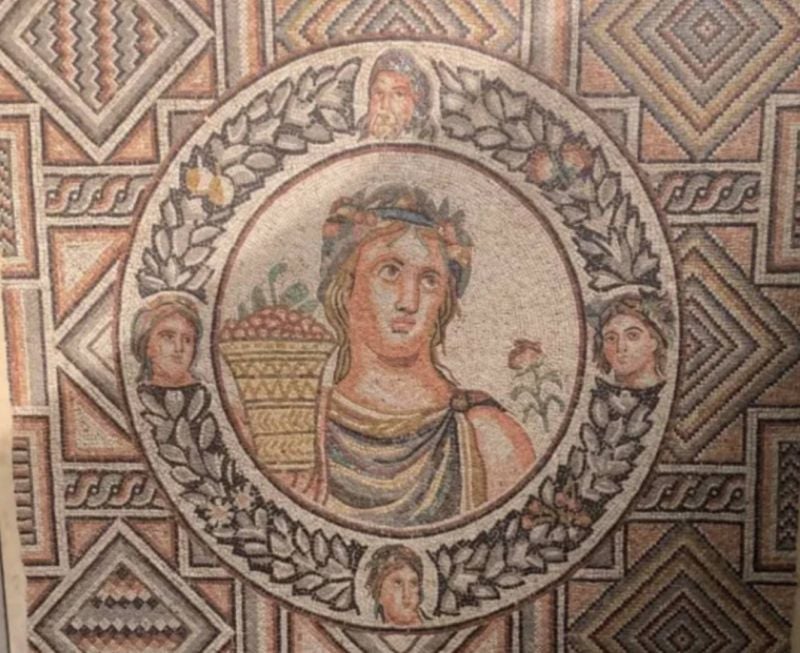
An ancient mosaic showing a personification of autumn, allegedly illegally removed from Lebanon in 1987. (Credit: New York District Attorney’s Office)
On June 5, after Banque du Liban Governor Riad Salameh, Interpol issued a red notice for Lebanese antiquitie collector Georges Lotfi, 82. A retired pharmacist, Lotfi is originally from Tripoli. He has previously collaborated with US justice as an informant on several high-profile antiquity seizure cases in recent years.
Lotfi’s name has been added to the list of Lebanese nationals (now nine) that Interpol has requested to provisionally arrest, pending extradition.
The notice comes after a criminal court in New York issued an arrest warrant against Lotfi after charging him with the possession of looted antiquities on March 8, 2022. The US warrant is only applicable on American soil.
This local arrest warrant was based on investigations launched the previous year by the New York County District Attorney’s Office. The court charged Georges Lotfi of stealing 24 antiques that he exported to the US in 1988, 34 years earlier.
Extradition impossible
Lotfi, who currently lives in Lebanon, refuted these accusations. He told L’Orient-Le Jour that he himself “declared [the antiques in question] to the US authorities” in 2021, when he wanted to lend them to New York’s prestigious Metropolitan Museum (MET) for a temporary exhibition.
“I was the one who declared them to the authorities and asked the US Attorney’s Office to inspect them in my office in New Jersey,” he said, adding that this was a standard procedure in the US.
After handing the keys to the warehouse to authorities in February 2021, Lotfi was “surprised” to see them seizing the items five months later.
Lotfi claims one of the prosecutors threatened him several times with legal action if he did not hand over the 24 items to the US authorities. But Lotfi refused to comply.
“I had bought the art pieces from Lebanese antique dealers licensed by the General Directorate of Antiquities in Lebanon,” he said, adding that he had “exported them to the US to keep them safe” from the Civil War (1975-1990).
“They had entered the country legally, through an accredited forwarder, who had collected the necessary documents” for them to pass through US customs, he added.
This has not convinced American investigators. In an affidavit, investigator Robert Mancene claimed that Lotfi knew the objects were stolen but believed that he had created a good enough paper trail that investigators would not be able to tell they were stolen, L’Orient Today had reported.
According to the New York-based investigators, Lotfi did not apply for a permit to export the 24 artifacts from Lebanon, thus violating Lebanese law, which stipulates that it is illegal to export any human-created objects made before the year 1700 CE from Lebanon without a permit.
Despite this, Interpol’s red notice is unlikely to lead to his extradition.
“He cannot be handed over to US justice, as the Lebanese state does not extradite its citizens,” said Lotfi’s lawyer, May Azoury.
“If he were to travel however, he would run the risk of being arrested in any Interpol member state, but this seems unlikely as his passport has been temporarily confiscated,” she added.
The Lebanese Public Prosecutor’s Office at the Court of Cassation was notified in January 2023 of the US indictment, issued in March 2022. The prosecutor’s office took up the case before the red notice was issued.
“The case now falls within the jurisdiction of the Lebanese courts,” said Azoury, adding that Lebanese law recognizes the right to possess archaeological artifacts.
“The law of 1933 and the decree of 2016, corroborated by a decision of caretaker Minister of Culture, Mohammad Mortada, in 2022, enshrines the right of individuals to possess ancient artifacts, provided that they are not listed and classified by the Directorate General of Antiquities,” she said, stressing that “the artifacts in question are not classified.”
“In any case, the charges against Georges Lotfi are statute-barred, as he claimed to have made his acquisitions more than 30 years ago,” she continued.
Yet, the US law considers the criminal act to be continuous, not punctual: the statute of limitations begins to run when the illegal possession ceases, not when it begins.
Restitution to Lebanon?
In parallel with this criminal case, Lotfi lodged a complaint for misuse of power with the State shura Council in December 2021, seeking the annulment of Mortada’s decision issued in October 2021.
In this decision, the minister decreed that the disputed property belonged to the Lebanese state, and not to Georges Lotfi, and asked the competent US authorities, via the Lebanese Foreign Affairs Ministry, to repatriate the 24 items.
According to Azoury, this decision is all the more astonishing given that “the culture minister is contradicting his own decision dated April 2022, according to which if private individuals have unequivocally possessed unclassified ancient items for more than 10 years, they are the owners of these items, and are furthermore exempt from proving their origin and method of acquisition.”
Mortada told L’Orient-Le Jour, “the decision on the possession of items applies only in cases where there are no suspicions about their origin.”
“However, we have proof that the mosaics exported by Mr Lotfi were stolen,” the minister said, without giving further details.
“We have notified the US justice system that the items in question are the property of Lebanon and the Lebanese, and we asked for them to be returned,” Mortada added.
However, the US authorities have not yet complied with the culture minister’s request. The Associated Press quoted a Lebanese judicial source as saying that the US authorities “said they would repatriate the antiquities to Lebanon on condition that Lebanese authorities put Lotfi under arrest.”
This is “false” news, said the minister, explaining that US justice intends to temporarily keep the items for evidence in the American proceedings.
The US embassy in Beirut refused to make any comments on the ongoing investigations.
This article was originally published in French in L'Orient-Le Jour. Translation by Joelle El Khoury.
